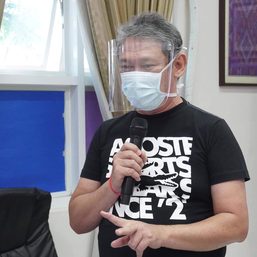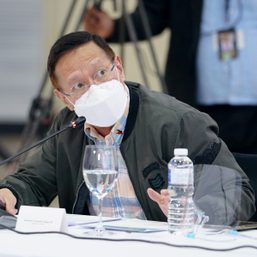SUMMARY
This is AI generated summarization, which may have errors. For context, always refer to the full article.

(Part 2)
READ: Part 1 | COVID 19: The Philippines’ race for a cure
What do virgin coconut oil (VCO), lianhua qingwen, convalescent plasma, tocilizumab, colchicine, rhinovirus, and ivermectin have in common?
They’ve been touted as alternative treatments for COVID-19, mentioned by different doctors or ordinary folks in various chat app groups and spaces, where people’s levels of anxiety, if not desperation, for immediate relief from a pandemic that hasn’t gone away is mirrored. Some politicians and government officials had admitted to taking some of these alternative treatments, raising the curiosity antenna about other options that may be out there.
Mainstream media has been caught in the middle of the information highway. They are torn between paying attention only to regulatory agencies that warn the public against using or totally trusting these alternatives and listening to other experts, individuals, and groups that have tried some of these mostly cheaper alternatives and swear by them.
Should they be given space or totally shut out of the health information ecosystem? Or should the media just responsibly report about these alternatives and allow the public to make informed decisions? After all, health is a personal right and a personal choice, too.
As of Monday, March 29, some lawmakers had started to call for the conduct of inquiries in aid of legislation pertaining to at least one of these alternative treatments, ivermectin (IVM).
What’s out there?
Because there has been an astounding number of deaths recently, caused by rising infections and an arbitrary vaccination program, doctors and individuals alike with family members positive for the deadly virus have turned to social media and the news for information about alternatives.
Among the early drugs that were identified was hydroxychloroquine, whose use was later discouraged by the US Food and Drug Administration (FDA) and World Health Organization (WHO) over safety issues. Another was remdesivir, which the WHO has also warned against. Yet the FDA gave remdesivir the go-signal for emergency use in combination with what they referred to as an immunomodulator.
Dr Anthony Fauci, director of the US National Institutes of Allergy and Infectious Diseases, had previously said positive things about remdesivir and its potential to cure COVID-19, but this was disputed by another study done by The Lancet which showed there were no clear benefits from its use by already hospitalized patients.
But what other alternatives are there?
- In 2020, media reported on the potential of VCO to lower the coronavirus load by 60% to 90% for mild to moderate cases. In December of the same year, the Philippines’ Department of Science and Technology reported that VCO helped reduce the symptoms of probable and suspect COVID-19 cases. However, further research is needed to understand how well VCO works on high viral loads. VCO capsules go for around P7 a piece, although many VCO supplements currently have no approved therapeutic claims.
- Lianhua Qingwen, a Chinese medical preparation used to treat viral influenza and SARS in China in 2002-2003, can be beneficial when treating COVID-19, according to the US’ National Institutes of Health (NIH), and even personal accounts and testimonies. This is especially so when used in combination with other antiviral drugs. The NIH also recommended further research to clarify unconfirmed effects, regulatory mechanisms and adverse reactions. The Philippine FDA has not approved its use for the treatment of COVID-19.
- In August 2020, the US FDA authorized the use of convalescent plasma against the coronavirus. The blood plasma taken from recovered patients was said to contain potent antibodies that could help fight the disease faster and provide protection to those exposed to the virus.
- Tocilizumab, commonly used as an immunosuppressant for rheumatoid arthritis, has been recommended for use in combination with dexamethasone against COVID-19 by the US NIH as of March 5, 2021. It has yet to get US FDA approval for use against the coronavirus.
- Colchicine, an anti-inflammatory drug usually used against gout, has also gotten some interest in treating moderate to severe COVID-19. In an August 2020 study, Brazilian scientists found that colchicine was “safe and well-tolerated” and reduced the length of hospitalization and supplemental oxygen therapy. In January 2021, Philippine Health Undersecretary Maria Rosario Vergeire said the department was studying the use of colchicine for severe COVID-19 cases, citing emerging studies. But she also said use of the drug would still have to go through the country’s regulatory process if it would be used against the virus.
- University of Glasgow scientists recently reported that human rhinovirus, which causes the common cold, appears to be able to suppress COVID-19. In their study – published on March 23 in the Journal of Infectious Diseases – the scientists at the MRC-University of Glasgow Centre for Virus Research reported findings that rhinovirus “triggers an innate immune response that seems to block SARS-CoV-2 replication in cells of the respiratory tract.” Researchers also said that an “increasing prevalence of rhinovirus could reduce the number of new COVID-19 cases.”
- Ivermectin, not yet FDA-approved either in the US or here in the Philippines, has been the latest hot topic in various chat groups, Zoom webinars, and medical circles. Advocates have been pushing for the type that can be used by humans because, according to those who have done researches, it has been found to reduce infection by at least 86% and deaths by at least 68%. The Philippine FDA said on Monday, March 29, that doctors and hospitals who want to use it in their treatment of COVID-19 can apply for a compassionate use permit. This is perhaps the first indication of openness to IVM on the part of the FDA.
Data, precautions on ivermectin
Ivermectin is an antiparasitic drug that had been used to treat onchocerciasis (river blindness), scabies, and other parasitic diseases. Recent studies from reputable doctors have been showing evidence that it has “highly potent anti-viral and anti-inflammatory properties against COVID-19.”
A study published in June 2020 found that IVM was shown to be an inhibitor of SARS-CoV-2, the virus that causes COVID-19, in vitro or outside a living organism. Essentially, this means that IVM is able to control the replication of the coronavirus that very quickly attaches itself to cells and spreads in the human body, overwhelming the lungs and other vital organs. The authors called for trials that would determine a possible and effective dosage in humans.
For critical care and pulmonary medicine specialist Dr Pierre Kory of the FLCCC, however, what is compelling are the epidemiologic data that he saw in several areas like Uttar Pradesh in India and 8 states in Peru.
Senior data analyst Juan Chamie’s data in Peru showed that in the 8 states, the number of deaths plummeted over time – after distribution of IVM. Dr Kory also cited Utter Pradesh, with a population of over 210 million, that has registered some of the lowest mortality rates among COVID-19 cases.
A meta-analysis funded by Unitaid, an agency hosted by the WHO, reviewed 18 randomized controlled trials involving 2,282 patients, and found early encouraging results. IVM treatment showed a 75% reduction in mortality, a faster time to clinical recovery and viral clearance, and reduced hospitalization.
Still, the authors led by Dr Andrew Hill of the University of Liverpool’s Department of Pharmacology and Therapeutics cautioned that IVM should “be validated in larger, appropriately controlled randomized trials before the results are sufficient for review by regulatory authorities.”
Debates
In the Philippines, there has been an abundance of stories of recoveries from patients who were COVID-positive and were given ivermectin, with some of them even posting their stories in a Facebook group. Using scientific standards, some doctors and regulators alike, however, say these are all anecdotal and are not enough to warrant regulatory approval.
Within the medical community, debate has been heated, with no less than the Philippine Medical Association (PMA) issuing on March 27 a circular signed by its officers, saying that physicians who prescribe medicines not approved by the FDA “may be subjected to criminal prosecution for violating the laws of the land…” Furthermore, citing the PMA’s code of ethics, they said, “Prescribing unregistered medicines to patients will constitute an unethical act.”
Dr Rafael Castillo of the Manila Doctors Hospital responded to the PMA on March 28, saying that, for many patients who are financially-challenged, the use of “cheap, safe and probably effective drugs is the only hope they could cling to.”
The warnings may have bewildered some doctors, he said, who could not understand why such a circular had to be issued at a “difficult time like this when every community practitioner is trying to treat mild to moderate cases at home or in the isolation facilities so they don’t have to need hospitalization and further exhaust the healthcare system.”
The warning from both the DOH and the PMA, Dr Castillo said, may be perceived as “patently unconstitutional” because it interferes with the prescription and administration of a life-saving medicine, particularly for the poor and marginalized citizens of the country.”
In other countries like the US and South Africa, there have been cases filed in courts on behalf of patients to compel doctors to prescribe IVM. Reports from Buffalo, New York, described dramatic and life-saving results “within 12 hours” or “in less than 48 hours” after the first dose was administered to ICU patients already hooked to a ventilator.
Yet, in Brazil, where the coronavirus situation has gone haywire, controversial President Jair Bolsonaro pushed for both hydroxychloroquine and IVM, which clearly have failed to tame the virus. Brazil has recorded over 12.5 million COVID-19 cases, produced a variant, and reported its highest 100,000 new positive cases in just a day in the third week of March. More young people are also getting infected by this pernicious virus.
Call for sobriety
The clash of opinions from experts can be confusing for those who have not closely followed the issue of COVID-19 treatment.
How could doctors and medical experts, who both claim to put patient first, be on the opposite sides of the fence? Who to believe and trust? Who to follow?
The Healthcare Professionals Alliance against COVID-19 has acknowledged the potential of IVM but reminded both sides to wait for the results of ongoing clinical trials.
“As healthcare professionals, we must be responsible for the unintended effects of our actions, especially if they can lead our people to confusion. The war is against the pandemic, not against each other,” said their statement.
No less than the WHO has declared that health is a fundamental human right as the right to life is. Health is also a personal choice made on the basis of solid information and a clear understanding of risks and benefits.
In this war against a rapidly mutating coronavirus, governments and societies are caught between sticking to rules and taking reasonable risks as they deal with an agile enemy that shows no signs of tiring. – with Rappler Research/Rappler.com
Add a comment
How does this make you feel?


![[Time Trowel] Evolution and the sneakiness of COVID](https://www.rappler.com/tachyon/2024/02/tl-evolution-covid.jpg?resize=257%2C257&crop=455px%2C0px%2C1080px%2C1080px)





![[OPINION] On Ivermectin, COVID-19 response, and the business sector](https://www.rappler.com/tachyon/2021/05/tl-sq-1.jpg?resize=257%2C257&crop_strategy=attention)
There are no comments yet. Add your comment to start the conversation.